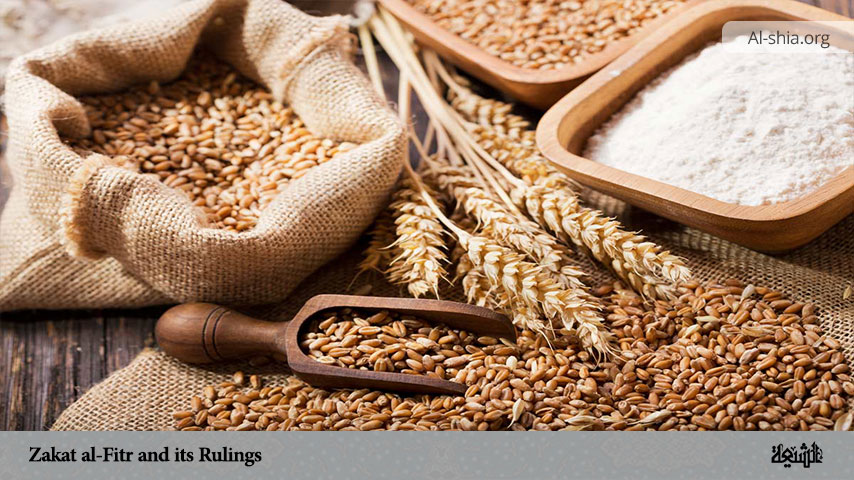One important act of worship that is associated with the Ramadan fast is Zakat al-Fitr. Zakat al-Fitr is the charity to be given to the poor at the end of the Ramadan fast. Every Muslim is expected to pay Zakat al-Fitr after fasting in the month of Ramadan. The main purpose of Zakat al-Fitr is to provide for the poor so that they can celebrate the festival of breaking the fast (`Eid al-Fitr) along with the rest of the Muslims. Imam al-Sadiq (PBUH) says, “Whoever ends his fasting with nice words or nice actions, Almighty God will accept his fasting.” People asked: “O, son of the Apostle of God! What is the nice word?” He replied: “Attestation that there’s no god (literally: a person or deity deserving worship) but Allah and the nice action is paying zakat al-fitra.[1]“
In this article, we shall discuss Zakat al-Fitr and its related rulings in Islam under the following headings:
Definition:
Zakat al-Fitr is a duty (i.e., a charity) which is required of every Muslim, whether male or female, minor or adult (as long as they have the means to do so) after the completion of the Ramadan fast.
Differences between Zakat and Zakat al-Fitr:
Zakat al-Fitr is different from Zakat in the following ways:
- Eligibility: Zakat is meant for the rich whose wealth (such as gold, silver, etc.) is up to the stipulated amount but Zakat al-Fitr is meant for all.
- Items and limit: The items to be considered in Zakat include gold, silver, agricultural products such as wealth, goats, and sheep when there are up to the stipulated amount but the items used for Zakat al-Fitr are the staple food.
- Amount to be given: The amount given in Zakat varies based on the amount of wealth but the amount to be given for Zakat al-Fitr is the same for all.
- Timing: The time to give Zakat depends on the Zakat year of such a person and this varies from one person to another, but the time for Zakat al-Fitr is after the completion of the Ramadan fast.
Who are to pay Zakat al-Fitr?
Zakat al-Fitr is compulsory for every adult and conscious person who is neither poor nor a slave. It is required of the head of the family to give it out on behalf of himself as well as on behalf of all those who are dependent on him.
In accordance with the verdict of the Islamic Jurists, the payment of Zakat al-Fitr is not compulsory for a needy person who cannot meet up his own expenses. However, for someone who has 3 Kg of staple food (such as wheat, rice, etc.) or its equivalent value, it is permissible (mustahabb) for him to pay it as Zakat al-Fitr. And if he has some dependent (s) in his family, he may circulate it among his family members with the intention of Zakat al-Fitr and it is preferable that the last member of the family gives it to an individual that does not belong to the same family[2].
For a guest who comes to one’s home on the night before Eid al-Fitr, paying for his zakat al-Fitr is not the duty of the host. However, in the case where the guest is considered the host’s dependent if he pays his own zakat al-Fitr with the permission of his host, the host is released from paying it.
If the wife is dependent on her husband, the husband should pay his and her zakat al-Fitr provided that he could afford it. Anyhow, if the wife is neither dependent on her husband nor any other person, she should pay her zakat al-Fitr herself.
Meanwhile, in case the wife does not yield to her husband’s sexual needs, her husband is not exempted from paying her zakat al-Fitr, unless she is dependent on another person. Furthermore, If the head of the family -who is supposed to pay- does not pay zakat al-Fitr for his wife and children. They have no duty. They are not required to pay zakat al-Fitr on their own.
Time for Zakat al-Fitr
When the sighting of the new moon in the month of Shawwal is established, one can separate the Zakat al-Fitr. For the person who shall offer the Eid prayer, the obligatory precaution is to pay Zakat al-Fitr before the Eid prayer. But a person who does not perform the Eid prayer for one reason or the others has time for its payment until ‘noon’ of Eid day[3].
Items for Zakat al-Fitr
Zakat al-Fitr can be given from wheat, barley, date, rice, or any staple food in a region. However, it is not necessary to pay for it from the most consumed food. The equivalent price of such food items can also be given in cash as well[4].
Amount of Zakat al-Fitr
For himself as well as on behalf of each dependent, a person should pay one Sa’a (approximately 3 Kgs) of food commonly consumed by people (like wheat, barley, date, currant, rice, corn, etc.) or its equivalent value to a needy person[5]. That is, for every member of a family, 3 Kg or its equivalent value should be paid. For instance, for a family of 3 members, 9 Kg of food must be paid.
Recipients of Zakat al-Fitr
Zakat al-Fitr is given to those who can receive Zakat. There are eight categories of recipients of Zakat al-Fitr:
- The poor: Those who do not have enough for their basic needs
- The destitute: Those who become weaker or who are under the hardship of insolvency
- Zakat collectors
- Those who need special attention and kind treatment so that their hearts become inclined to Islam
- Freeing slaves
- Those unable to pay their debts
- Spending in the cause of Allah
- Travellers who run out of money and the handicapped
Other Miscellaneous rulings on Zakat al-Fitr
Ruling 1: If one puts aside some amounts as zakat al-Fitr, one should use the same for the zakat al-Fitr and he cannot replace it with another amount.
Ruling 2: It is not allowed to pay zakat al-Fitr to the needy person before the month of Ramadan, because it is invalid. However, one may give him the amount as a loan and on Eid day consider it as zakat al-Fitr.
Ruling 3: If a deserving person is not found in one’s city, we may send and zakat al-Fitr to another city.
Ruling 4: There is no problem in giving the power of attorney to somebody to pay zakat al-Fitr on your behalf in another city. However, it is a must that he pays zakat al-Fitr at its specific time.
Ruling 5: If one forgets to pay zakat al-Fitr at its specific time, he will not be exempted from paying it. In such a case, you should put it aside and pay it without intending to be adā’ or qadā’.
Ruling 6: `Adālah (being just) or religiousness of the receiver of zakat al-Fitr is not a condition. However, according to caution, one should not pay it to a person who openly commits major sins.
Ruling 7: It is not allowed for a father to pay zakat al-Fitr to the children for covering their life needs. If the children are needy, it is the duty of the parents (by shar`) to provide for their living. However, there is no problem paying Zakat al-Fitr to them for settling their loan or providing them with those needs whose providing is not the parents’ duty.
Ruling 8: It is permissible to pay zakat al-Fitr to one’s honourable deserving relative as a gift, without being necessary to tell them that it is zakat al-Fitr, but one should pay it to them with the intention of zakat al-Fitr.
Ruling 9: There is no problem in spending zakat al-Fitr for propagating Islamic teachings. Anyhow, it is a caution to give it to the needy.
Ruling 10: Non-sayyids are not allowed to pay their zakat al-Fitr to sayyids.
Ruling 11: A charity organization which collects zakat al-Fitr from people in order to distribute it to the needy. As per the obligatory caution, each needy person should not receive lesser than one Sā` (3 kg) or its value (no matter whether or not all the needy receive zakat al-Fitr).
Ruling 12: One may pay each needy person several Sā`s or even an amount which covers their yearly expenses. It is an obligatory caution not to give a needy person, and the latter not to receive, an amount which exceeds their yearly expenses.
Ruling 13: It is not compulsory to give all of Zakat al-Fitr to one person. It can be shared among several poor people. However, based on recommended precautions, a poor person should not be given less than 3 Kg or its equivalent. There is no harm if more than that is given to him.
NOTES:
[1] Ṣadūq, al-Tawhīd, p. 22.
[2] https://www.leader.ir/en/book/27/Rules-of-Fasting (Ruling No: 228)
[3] https://www.leader.ir/en/book/27/Rules-of-Fasting (Ruling No: 234)
[4] https://www.leader.ir/en/book/27/Rules-of-Fasting (Ruling No: 232)
[5] https://www.leader.ir/en/book/27/Rules-of-Fasting (Ruling No: 233)






